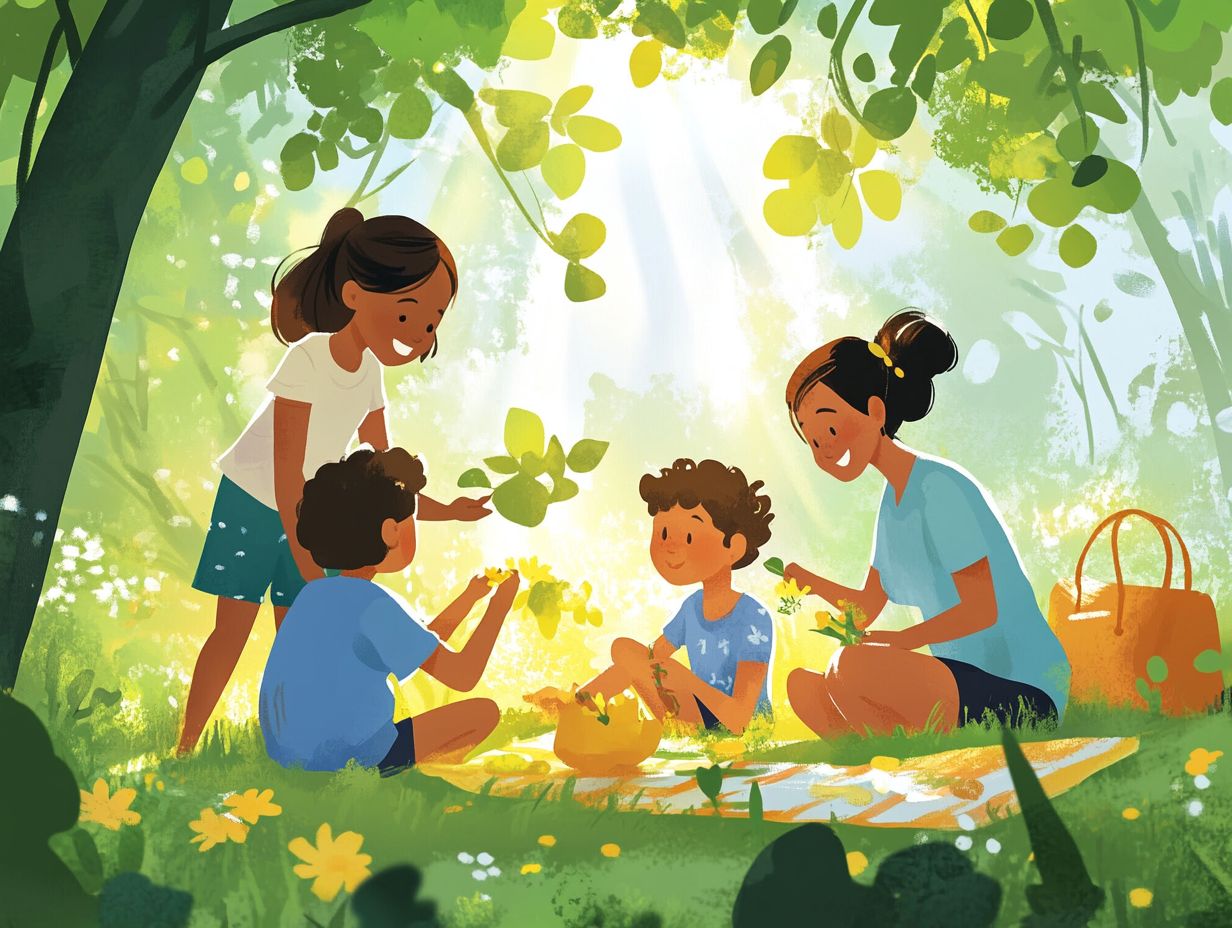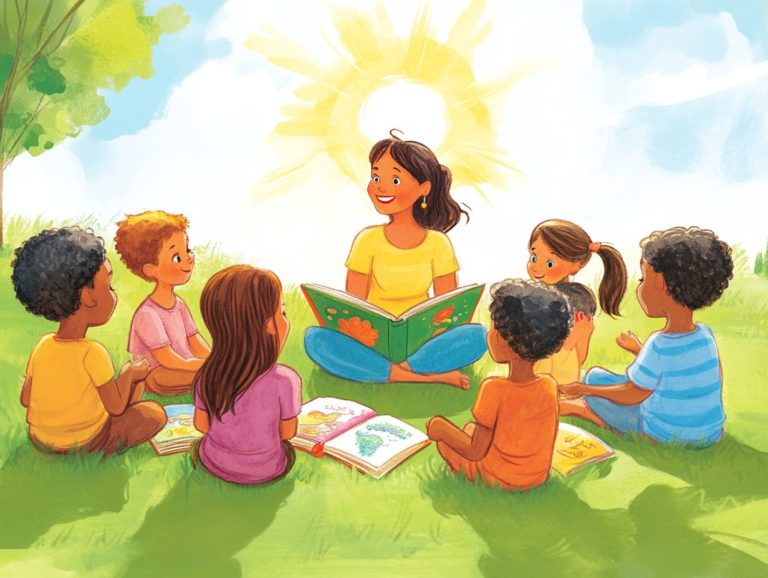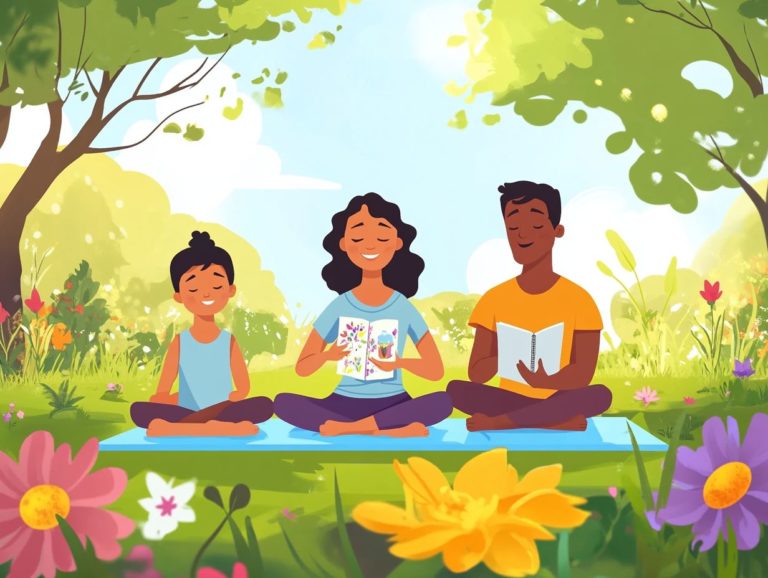5 Mindful Nature Activities for Family Bonding
In today s fast-paced world, carving out quality time for your family can feel like an uphill battle. However, immersing yourselves in nature presents an elegant solution.
Get ready to explore five fantastic nature activities that bring families together! This article delves into mindful nature activities that enable families to connect while fostering well-being and creativity. From invigorating hikes to tranquil outdoor picnics, you’ll uncover the simple joys of gardening, crafting, and even stargazing together.
Explore how these enriching experiences can strengthen your relationships and create cherished memories that last a lifetime.
Contents
- Key Takeaways:
- 1. Nature Walks and Hikes
- 2. Outdoor Picnics
- 3. Gardening and Planting
- 4. Nature-Based Crafts and Activities
- 5. Camping and Stargazing
- Why Is Nature Important for Family Bonding?
- How Can Mindful Nature Activities Help Strengthen Family Relationships?
- Frequently Asked Questions
- What are 5 mindful nature activities for family bonding?
- Why are mindful nature activities important for family bonding?
- How can these activities benefit children?
- Can these activities be done in any weather?
- How often should families participate in these activities?
- Are there any safety precautions to keep in mind?
Key Takeaways:

- Reconnect as a family by enjoying walks, picnics, gardening, and camping in nature!
- Nature activities promote physical and mental well-being, reduce stress, and improve communication and relationships within the family.
- Make nature activities fun by involving everyone, setting a positive tone, and being mindful of safety precautions for a safe and enjoyable experience.
1. Nature Walks and Hikes
Nature walks and hikes introduce mindfulness practices. They allow your family to connect with the natural world while enjoying physical and mental health benefits.
Engaging in outdoor activities promotes understanding feelings and enhances focus, especially in children, as they immerse themselves in the beauty and tranquility that nature provides.
By nurturing a quiet awareness of your surroundings, you can be more aware of your surroundings. This leads to better emotional regulation and improved family dynamics. To boost attention spans during hikes, consider incorporating listening exercises pause to hear the rustle of leaves or the gentle flow of water. This practice encourages everyone to actively engage with the environment.
For younger children, age-appropriate activities like a scavenger hunt for specific leaves or insects can keep their enthusiasm high. These activities foster curiosity and teamwork. These shared moments not only strengthen family bonds but also lay the groundwork for developing essential life skills that will benefit everyone in the long run.
2. Outdoor Picnics
Outdoor picnics offer you a delightful chance to gather with family and friends. Engaging in group activities encourages mindfulness. It s an opportunity to truly savor the moment and deepen your connections.
By weaving mindfulness activities into your gatherings, you can elevate the experience significantly. Imagine focusing on the flavors and textures of your food through mindful eating practices, which enhances your appreciation for the meal and paves the way for healthier, more meaningful conversations.
You might also consider incorporating group games that stimulate communication and understanding feelings, helping to forge stronger bonds among everyone present.
Organizing communal picnics in local parks can serve as a wonderful platform for community service. This creates an atmosphere of support and togetherness, bringing individuals from diverse backgrounds together and fostering a profound sense of belonging and shared responsibility.
3. Gardening and Planting
Gardening and planting activities present you and your family with a remarkable opportunity to connect with nature while cultivating mindfulness. Whether you’re nurturing plants in a meditation garden or growing your own food, you create a meaningful relationship with the earth.
This practice enhances emotional understanding by prompting you to observe, reflect, and respond to the needs of living things. It also strengthens community ties through the collaborative spirit of community gardens. These green spaces serve as gathering points where neighbors exchange knowledge, share resources, and foster a sense of belonging, all while transforming lives through shared purpose.
For families, engaging in age-appropriate gardening activities like planting seeds, watering plants, or harvesting vegetables offers enriching opportunities for bonding and teamwork. Children learn responsibility and develop patience and empathy, essential traits that deepen family connections and promote open communication.
4. Nature-Based Crafts and Activities

Nature-based crafts and activities offer a unique opportunity for you to unleash your creativity while embracing mindfulness. They allow families to forge a deeper connection with the environment and explore their artistic sides through various outdoor pursuits.
Activities like leaf pressing, flower arranging, and stone painting add a personal touch to your projects and nurture a profound appreciation for the beauty around you. Imagine embarking on a scavenger hunt with your family, seeking specific treasures like pinecones or uniquely shaped leaves. This encourages keen observation and fosters thoughtful engagement with the natural world.
Mindfulness games, such as taking turns to describe the sensory experiences of crafting outdoors, can elevate your emotional intelligence. By weaving elements of nature into your projects, you create a feeling of peace and presence, allowing for rich artistic expression that grounds your thoughts in the vibrant tapestry of the environment.
5. Camping and Stargazing
Camping and stargazing offer you enriching experiences that nurture mindfulness and emotional intelligence. They immerse your family in the beauty of nature while promoting outdoor activities that enhance well-being.
When you set technology aside, you open the door to reconnecting with each other and yourselves. This paves the way for deeper conversations and moments of genuine reflection. The enchanting atmosphere of a campfire combined with the vastness of a starlit sky encourages mindfulness practices like meditation or gentle yoga beneath the stars.
To maintain this bond after returning home, consider scheduling mindfulness Zoom sessions. These gatherings can be a wonderful opportunity to share your camping experiences, discuss the benefits of your nature retreat, and participate in guided meditation practices together, fostering connection and collective growth long after the camping trip.
Why Is Nature Important for Family Bonding?
Nature serves as a crucial catalyst for strengthening family bonds. It offers a rich tapestry of opportunities for mindfulness and emotional intelligence to thrive in nurturing environments while delivering health benefits that fortify relationships.
When you and your family step outdoors, you don’t just bask in the fresh air and breathtaking vistas; you engage in shared activities that cultivate deeper communication and understanding. Numerous studies highlight that time spent in natural surroundings significantly reduces stress and enhances overall well-being.
For instance, families that regularly hike together often find their emotional connections deepen, with open conversations flowing effortlessly amid nature’s beauty. Countless anecdotes illustrate how families rediscover a profound appreciation for one another through the art of storytelling around the campfire after embarking on camping adventures.
These cherished moments not only boost physical health but also enrich the emotional ties essential for maintaining family unity.
What Are the Benefits of Mindful Nature Activities?
Engaging in mindful nature activities offers a wealth of benefits, including improved health, enhanced emotional intelligence, and a longer attention span for both you and the children in your life.
These activities foster a profound connection with the environment, leading to significant stress reduction as you immerse yourself in the calming sights and sounds of the great outdoors. Imagine taking a walk through the forest or enjoying a mindful sit by a serene lake! These experiences encourage you to pay close attention to your surroundings, enhancing your focus and promoting a deep sense of relaxation.
Practicing mindfulness in nature can also elevate your mood studies have shown that spending time in green spaces effectively lowers anxiety levels. By incorporating activities like nature journaling, where you observe and document your feelings and experiences, you nurture emotional intelligence. Engaging in breathing exercises amidst the trees can sharpen your attention span, making your time outdoors not just enriching but also profoundly therapeutic.
Why not plan a family craft day in nature this weekend?
How Can Families Incorporate Nature into Their Daily Routine?

Incorporating nature into your daily routine can be seamlessly achieved through simple yet effective strategies that promote mindfulness and encourage outdoor activities. These strategies foster supportive family dynamics.
Consider scheduling regular visits to local parks; this not only allows your family to bask in fresh air but also opens the door to invigorating physical activities like hiking or biking. Creating a food garden at home offers an educational and rewarding experience, where family members can learn about plant growth and enjoy the literal fruits of their labor.
Organizing community service events focused on environmental preservation can enhance your family’s connection to nature. It also instills a sense of responsibility towards the planet. By consistently engaging in these enriching activities, you and your family can deepen your bond with the natural world, cultivating a lasting appreciation for the environment.
Creating a food garden or meditation garden offers health benefits and opportunities for mindfulness activities.
What Are Some Tips for Making Mindful Nature Activities Fun for the Whole Family?
Making mindful nature activities enjoyable for your entire family requires some creative approaches that encourage participation. These approaches also nurture emotional intelligence within supportive groups.
To make this happen, consider incorporating engaging games like scavenger hunts, where each family member searches for specific plants or animal tracks. This way, you blend fun with the chance to learn about the local ecosystem.
Another idea is to introduce mindful birding, which means observing birds while focusing on your surroundings, or listening exercises to enhance observation skills.
Creating a nature journal is another great idea. Invite your children to draw or write about their discoveries, enhancing their observational skills. You can also try visual meditation or mindful play to further engage their senses and improve their attention span.
It’s crucial to strike a balance between structured activities and periods of free exploration. Allowing your children the freedom to roam, climb trees, or simply soak in the sounds of nature can spark their curiosity and enthusiasm. Incorporate balance exercises or outdoor mindfulness practices to instill a sense of stability and peace.
This flexibility sparks a lasting love for the outdoors while strengthening family bonds through shared experiences.
What Are Some Safety Precautions to Take When Doing Outdoor Activities with Children?
When engaging in outdoor activities with children, it s essential to implement safety precautions that guarantee a secure and enjoyable experience. This ensures mindfulness and fosters healthy group dynamics.
This means wearing the right gear, like helmets and sturdy shoes, which shields against injuries and boosts confidence in movement. Encouraging participants to stay hydrated by carrying water and taking regular breaks is vital for maintaining energy levels, especially during physically demanding tasks.
Being mindful of the environment such as recognizing potential hazards and staying attuned to weather changes greatly enhances safety. By adhering to these precautions, you can create an atmosphere where mindfulness thrives, allowing everyone to connect with one another and their surroundings while actively contributing to the community.
Additionally, learning from experts like Helen Macdonald and Ron Finley can provide valuable insights into mindfulness practices and community gardens.
How Can Mindful Nature Activities Help Strengthen Family Relationships?
Mindful nature activities are a great way to strengthen your family relationships, enhance emotional intelligence, and create supportive environments that boost communication and connection. Techniques from mindfulness exercises and mindfulness games can facilitate these processes.
When you engage in shared experiences, like hiking together or tending to a garden as a family, you naturally bond over common goals and face challenges as a unit. For instance, while navigating a trail, you and your family members might share stories and thoughts that wouldn t typically surface in the bustle of everyday life. This fosters deeper understanding and empathy among you. Reading books like H is for Hawk by Helen Macdonald can also provide inspiration and deepen your connection to nature.
Collaborating on a garden project builds teamwork and patience, as everyone learns to draw on each other s strengths. These moments carve out a safe space for open dialogue, allowing your family to express ideas and emotions freely. Ultimately, this openness solidifies your emotional connections, enriching your family dynamics. Explore fun mindfulness apps that can guide your activities!
Frequently Asked Questions
What are 5 mindful nature activities for family bonding?
1. Nature scavenger hunt: Create a list of items to find in nature and have your family work together to collect them. This encourages teamwork and observation skills.
2. Outdoor yoga: Find a peaceful spot in nature and practice some calming yoga poses with your family. This promotes relaxation and mindfulness.
3. Nature art: Use materials found in nature to create art together. This allows for creativity and appreciation of natural beauty.
4. Nature hike: Take a hike together and make a game out of identifying different plants, animals, and natural features. This promotes physical activity and learning.
5. Picnic in the park: Pack a healthy lunch and enjoy a meal together surrounded by nature. This allows for quality time and appreciation of the environment.
Why are mindful nature activities important for family bonding?
Mindful nature activities encourage families to slow down and appreciate the present moment together. They also promote communication, teamwork, and appreciation of the natural world.
How can these activities benefit children?
Engaging in mindful nature activities can help children develop important skills such as observation, creativity, and problem-solving. It also promotes a sense of wonder and connection to the natural world. These activities can significantly benefit children with ADHD by improving social skills and enhancing their focus.
Can these activities be done in any weather?
Yes, these activities can be adapted for any weather. For example, a nature scavenger hunt can be done indoors on a rainy day, or outdoor yoga can be practiced in the snow with warm clothes. Joining a mindfulness Zoom session can also be a great way to stay connected and engaged, regardless of the weather.
How often should families participate in these activities?
Families can participate in these activities as often as they’d like, but setting aside time at least once a week can be beneficial for bonding and mindfulness. It’s also important to listen to each family member’s preferences and find a balance that works for everyone. Introducing age-appropriate mindfulness practices will ensure everyone has a positive experience.
Are there any safety precautions to keep in mind?
As with any outdoor activity, it’s important to be aware of potential hazards such as steep terrain, poisonous plants, or wildlife. Always supervise children and take necessary precautions to ensure a safe and enjoyable experience for everyone.





